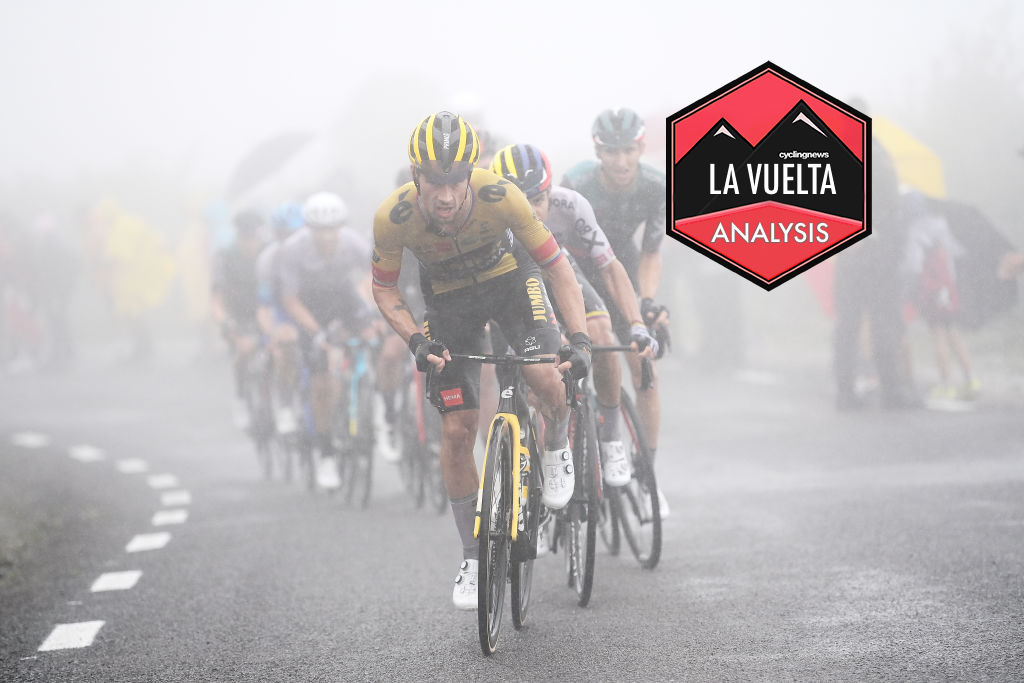Roglic remains key reference point in a very different Vuelta a España
Analysis: Established stars may yet bounce back despite setback

When three times Vuelta a España winner Primož Roglič (Jumbo-Visma) failed to respond to Remco Evenepoel’s surging series of accelerations on the Pico Jano on Thursday and ultimately lost almost 90 seconds to the young Belgian, the sense that the race was suddenly and unexpectedly entering seriously unfamiliar terrain was inescapable.
Up to now, after all, the 2022 race had been a new variation of recent Vuelta business as usual, with Jumbo-Visma dominating the opening team time trial, then swapping the leader’s jersey between various domestiques before Roglič claimed his tenth stage and moved back into la Roja on Tuesday.
Even losing the lead to Rudy Molard (Groupama-FDJ) on Wednesday formed part of a longer-term strategic plan, In fact, after three straight wins in the Vuelta overall, with the strongest team to support him and a tried-and-tested track record of bouncing back from adversity in the Tour de France, pre Thursday's stage it looked as if we were in for a largely predictable two-and-a-half weeks prior to Roglič’s fourth coronation as outright winner.
But no. Instead the emergence of QuickStep-AlphaVinyl's Evenepoel as race leader represents a huge change of direction for the Vuelta. At the same time, Enric Mas (Movistar), runner-up to Roglič in last year’s Vuelta, but never in a position to give the Slovenian a run for his money, has also moved ahead of the defending champion. And if that were not enough, on Thursday, the youngest rider in the Vuelta, Juan Ayuso (UAE Team Emirates), was also able to outgun Roglič as well.
It will be scant consolation to Roglič that another GC challenger of the calibre of Richard Carapaz (Ineos Grenadiers) lost even more time on Pico Jano and is now at nearly three minutes on Evenepoel. Or indeed, that of all the GC contenders bar Mas, with a fourth place on GC and 1:01 disadvantage on Evenepoel, Roglič is still the 'best of the rest'. After such a stunning start for himself and Jumbo-Visma on home soil in Holland and then even as recently as Tuesday at Laguardia, the yellow-and-black clad squad and their leader are now on the back foot.
Yet as former Vuelta podium finisher Joaquim Rodriguez turned TV pundit pointed out on Thursday evening, just because Roglič has suffered one, very striking, defeat, the chances of him turning the tables again and fighting for a fourth GC title are still pretty much intact.
It’s not just that Roglič has proved that overcoming setbacks is an in-house speciality. More to the point is that after his Tour injuries and abandon, the climbs of the first week of the Vuelta were always going to be where he was most vulnerable. If the first major mountain stage always has an innate ability to reveal weaknesses in the armour of any GC contender, Roglič is no exception to that rule.
Get The Leadout Newsletter
The latest race content, interviews, features, reviews and expert buying guides, direct to your inbox!
Furthermore, if Roglič was not on his best game on Thursday, he did anything but crack completely, either, once Evenepoel and Mas, as well as Ayuso had laid down the gauntlet. Unsurprisingly, all the other GC challengers made him do all the legwork in chasing down the Belgian in the six remaining kilometres to the summit. But barring Ayuso, none of them were then able to drop Roglič, either.
Rather than Pico Jano, the most definitive test of whether Roglič can or cannot fight for the overall victory this year in the Vuelta will come first this weekend, with two much tougher back-to-back mountain stages and then finally in the time trial in Alicante next Tuesday. By the TT at the latest, it’ll have become clear if Thursday’s performance was just a lone off-day, or the first sign of a broader, underlying lack of top race condition.
There can be no doubt, though, that this is a very different scenario to any of the previous three Vueltas that Roglič has won. In 2019 his mid-race time trial victory in Pau meant the race was his to lose, and although the mass attack by the opposition (also led by QuickStep, curiously enough) on the road to Guadalajara was a major subsequent wobble, he still remained in control all the way to Madrid. 2020 and 2021 were very similar stories, with Roglič defending an increasingly strong lead. Come what may in 2022, then, Evenepoel’s success has plunged the Vuelta into a new scenario, and makes for an intriguing race from hereon. Roglič, though, is still very much part of it.
Alasdair Fotheringham has been reporting on cycling since 1991. He has covered every Tour de France since 1992 bar one, as well as numerous other bike races of all shapes and sizes, ranging from the Olympic Games in 2008 to the now sadly defunct Subida a Urkiola hill climb in Spain. As well as working for Cyclingnews, he has also written for The Independent, The Guardian, ProCycling, The Express and Reuters.
